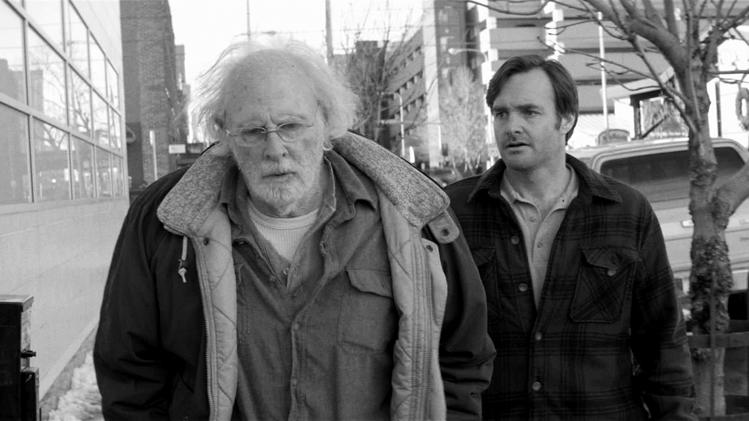Movie Review: ‘Nebraska’ The Dying Frontier

Alexander Payne’s latest film — following 2011’s excellent The Descendents — is a meditation on family, the past, and impending death. Payne’s decision to film in black and white, yet still focus on the gorgeous dilapidated midwest landscape, strips the film down to the bones and allows the focus to be on the characters. It was a wise decision because it is such a character piece with strong performances from Bruce Dern, Will Forte, and June Squibb.
Beginning in Billings, Montana, Woody Grant (Bruce Dern) has received a scam letter in the mail claiming he won a million dollars. Believing it to be real, and not trusting the mail with that amount of cash, he makes multiple attempts to walk to Lincoln, Nebraska, to claim his prize, unable to drive without a license. On the border of senility, or with just a knack for tuning the rest of the world out, he doesn’t listen to the wisdom of his nagging wife Kate (June Squibb), or his sons David (Will Forte) and Ross (Bob Odenkirk). But it’s David who has some sympathy for his aging father and agrees to make the trek to Nebraska to settle him down and spend some quality time with the old man.
Instead, it becomes a homecoming for Woody as they stop in his now-disappearing hometown, also in Nebraska. Like the elderly Woody, the town is on its last legs, devoid of younger generations. It has a long memory but no possible future. A small farming community, David and Woody wander in to reconnect with family and friends, only for word about Woody’s “winnings” to spread about town.
While Woody, like the town, is living on borrowed time, David is contemplating an uncertain future having just been dumped and working as a salesman at an electronics store. For him, it’s a literal trip into the past to uncover the truths about his father — the ones that didn’t involve a bottle. For Woody, he walks the line between uninterested and cordial to those he hasn’t seen in decades. And if Woody appears utterly aloof about what’s happening around him, Kate never holds her tongue. Her perfectly lucid and constant put downs and jabs at her husband and his past not only help paint the larger picture, but provide the film with some of its best laughs.
Payne decides to look death square between the eyes and show it not as something to be feared but as something that’s inevitable. He doesn’t shy away from nostalgia, but he doesn’t lay it on either and Dern’s curmudgeonly Woody aids in offsetting any chance of the film becoming over sentimental.
Although Payne didn’t write the script — a first for the director –, writer Bob Nelson’s script contains all of Payne’s trademarks from the biting wit to the strong emotional undercurrent that ties the story together. Mark Orton’s melancholic-yet-spritely fiddle score complements the film’s desire to relive the past without wallowing in it. Throw in a fantastic cast, including Stacy Keach as an old buddy of Woody’s with a mean streak, and Payne has crafted a wistful film that’s set on looking forward rather than backwards.
Rating: 4.5 out of 5






